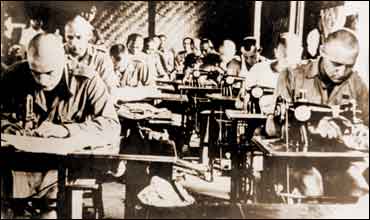| By Mark Fritz / Globe Staff / May 31, 2001 |
The enemy attacked and the army retreated, except for Nininger. He ran straight into the assault, shooting snipers out of trees, hurling grenades into foxholes, bayoneting anybody who got in his way. Three times he was wounded, but the soldier kept moving. He scooped up an enemy machine gun and sprayed bullets into bodies until, finally, he fell.
Second Lieutenant Alexander ''Sandy'' Nininger Jr. was stationed in the Philippines when the Japanese dropped in after pulverizing Pearl Harbor. His lone rampage into the maw of an overwhelming offensive earned him the first Medal of Honor of World War II, albeit posthumously.
The soldiers who survived faced a less fabled fate. They were beaten back at the Bataan peninsula, forced to surrender, and then herded 60 miles into hell during a span of three days in early 1942, a death march that remains the benchmark for brutalizing prisoners of war. Beaten, beheaded, dehydrated, malnourished, forced to work as skeletal slave laborers everywhere from Mitsubishi plants in Japan to that bridge on the River Kwai, one in three Allied POWs died in Asia during the war, compared with three of every hundred in Europe.
Sixty years later, Nininger's nephew, former Rhode Island state Senator John Patterson, introduced a bill that would let POWs sue Japanese corporations for back wages. It sailed through the Senate last year. Then a group of alarmed Japanese envoys visited leading House lawmakers, and argued that the US government's 1951 peace treaty with Tokyo settled all issues tied to the war. The bill was killed.
Rhode Island is just a skirmish in one of the last battles of World War II, part of a movement to settle scores, exact reparations, or just set the record straight as the geriatric ''greatest generation'' ages into oblivion.
And on the horizon is one of the most ambitious and potentially inflammatory efforts of all: scouring the untapped trove of intelligence files for fresh evidence of war crimes and war criminals from a nation widely viewed as less contrite than Germany has been about Axis atrocities.
A commission created by President Clinton in 1999 to declassify US intelligence records on World War II crimes has asked the CIA and other spy shops to begin turning over dossiers about Japanese war criminals. The effort is aimed in part at learning how heavily the United States overlooked atrocities in the scramble to retool Japan as an ally against new foes: the Soviet Union and Communist China.
The commission is operating under the Nazi War Crimes Disclosure Act of 1998, a byproduct of a renaissance in exacting World War II reparations that began in 1996, when lawyers successfully sued Swiss banks for pocketing the accounts of Jews killed by the Nazis.



